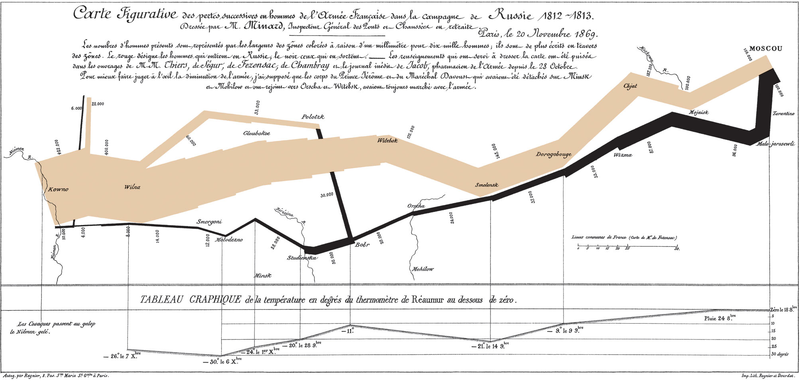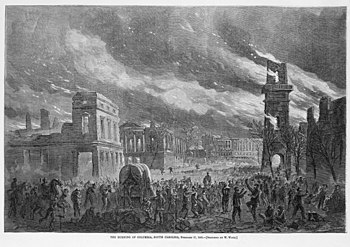General Discussion
Related: Editorials & Other Articles, Issue Forums, Alliance Forums, Region ForumsThe Civil War in one map
http://www.loc.gov/item/99447170Really worth clicking around & zooming in on. Two thoughts: one, the graphical demonstration of the collapse of the Confederate currency vs. the stability of the US dollar is profound; two, the chart really shows how important and large the often-neglected Western theater was (Grant did win the war, it was just in the west and it took another year for it to stop).
pscot
(21,024 posts)That really expands the definition of a map.
Recursion
(56,582 posts)
width of the column shows the size of Napoleon's (dwindling) army on the advance (peach) and retreat (black).
(Minard published this in 1869 and the infographic was born...)
hootinholler
(26,449 posts)Recursion
(56,582 posts)on the visual display of quantitative information. That was the most expensive training that never seemed like a waste of money...
Are_grits_groceries
(17,111 posts)I wish more people would listen to him and read his works.
pscot
(21,024 posts)about Napoleon's trip to Russia. Tolstoy would have approved. I wonder if he ever saw it.
Recursion
(56,582 posts)If either met the other, neither mentioned it. That would have been interesting.
pscot
(21,024 posts)The correspondence of Minard and Tolstoy. Meetings. The map as the fulcrum on which the plot turns.
Recursion
(56,582 posts)longship
(40,416 posts)I remember that one from years ago. When I first saw it -- was it Scientific American? -- I poured over it for a very long time. I even got out my Welles "Outline of History" and read that section with the graphic in front of me.
![]()
leveymg
(36,418 posts)FarCenter
(19,429 posts)The rest was grinding down the South slowly with superior manpower and supplies.
The little red dots have numbers. There must be a key that says what each represents. For example, the dots leading to Fort Stephen must include the Battle of Monocacy Creek, when an ancestor in the 8th Illinois Cavalry was wounded.
pscot
(21,024 posts)Such a sad waste.
johnnyreb
(915 posts)
coldmountain
(802 posts)London, October 20, 1861
For months the leading weekly and daily papers of the London press have been reiterating the same litany on the American Civil War. While they insult the free states of the North, they anxiously defend themselves against the suspicion of sympathising with the slave states of the South. In fact, they continually write two articles: one article, in which they attack the North, and another article, in which they excuse their attacks on the North.
In essence the extenuating arguments read: The war between the North and South is a tariff war. The war is, further, not for any principle, does not touch the question of slavery and in fact turns on Northern lust for sovereignty. Finally, even if justice is on the side of the North , does it not remain a vain endeavour to want to subjugate eight million Anglo-Saxons by force! Would not separation of the South release the North from all connection with Negro slavery and ensure for it, with its twenty million inhabitants and its vast territory, a higher, hitherto scarcely dreamt-of, development? Accordingly, must not the North welcome secession as a happy event, instead of wanting to overrule it by a bloody and futile civil war?
Point by point we will probe the plea of the English press.
The war between North and South -- so runs the first excuse -- is a mere tariff war, a war between a protectionist system and a free trade system, and Britain naturally stands on the side of free trade. Shall the slave-owner enjoy the fruits of slave labour in their entirety or shall he be cheated of a portion of these by the protectionists of the North? That is the question which is at issue in this war. It was reserved for The Times to make this brilliant discovery. The Economist, The Examiner, The Saturday Review and tutti quanti expounded the theme further. It is characteristic of this discovery that it was made, not in Charleston, but in London. Naturally, in America everyone knew that from 1846 to 1861 a free trade system prevailed, and that Representative Morrill carried his protectionist tariff through Congress only in 1861, after the rebellion had already broken out. Secession, therefore, did not take place because the Morrill tariff had gone through Congress, but, at most, the Morrill tariff went through Congress because secession had taken place. When South Carolina had its first attack of secession in 1831, the protectionist tariff of 1828 served it, to be sure, as a pretext, but only as a pretext, as is known from a statement of General Jackson. This time, however, the old pretext has in fact not been repeated. In the Secession Congress at Montgomery all reference to the tariff question was avoided, because the cultivation of sugar in Louisiana, one of the most influential Southern states, depends entirely on protection.
But, the London press pleads further, the war of the United States is nothing but a war for the forcible maintenance of the Union. The Yankees cannot make up their minds to strike fifteen stars from their standard. They want to cut a colossal figure on the world stage. Yes, it would be different if the war was waged for the abolition of slavery! The question of slavery, however, as The Saturday Review categorically declares among other things, has absolutely nothing to do with this war.
http://www.marxists.org/archive/marx/works/1861/10/25.htm
Are_grits_groceries
(17,111 posts)He was tough enough to stay the course and he was not afraid to use his troops. The fighting was horrendous but he knew he better not blink.
When Vicksburg fell, it was all over but the shoutin'.
Recursion
(56,582 posts)Washington and Grant.
TorchTheWitch
(11,065 posts)The western front was dominated by the Union early on in the war. Aside from Vicksburg they had everything, and Vicksburg fell in 1863. Lee surrendered in April, 1865, and a few weeks later the last battle was fought on the western front. The Confederacy was abysmal there losing every battle or at best managing a "tie". The final Confederate general to surrender his troops was a Cherokee, Stand Watie, in June of that same year.
Grant was a brilliant strategist in his western campaign which allowed the Union unfettered access to march out from the west through Atlanta all the way to the sea and up into Richmond. Sherman cut an ugly swath through the south obliterating everything in his path. the way. The war would have been over a lot sooner had the generals before Grant gotten off their butts. McClellan in particular was famous for never engaging. It was continually complained that he had "the slows". Grant did throw unbelievable amounts of soldiers through the grinder though making our Civil War still the bloodiest war in our history. Unfathomable numbers of lost lives.
An impressive number of soldiers on both sides fell in love with the West and remained to either start new lives or join the Indian wars.
Recursion
(56,582 posts)Pershing, of all people, said only two people understood strategic combat on this continent: Washington and Grant. Both were lampooned as buffoons, but both also delivered the goods.
TorchTheWitch
(11,065 posts)Which he didn't want to do in the first place. He was rather socially inept and far far too trusting as well as far far too forgiving. Though brilliant and ruthless in war, he was a shambles as President appointing his friends to his cabinet as personal favors who created a lot of scandals in receiving illegal bribes. After his stint as President he got swindled financially by a so-called friend (still naive and trusting) and died penniless. Interestingly, he was a good friend of Mark Twain who helped him write his memoirs once he found out he had cancer.
Washington was a pretty interesting character. He was fond of gambling at cards often all night long forcing his staff to also remain awake. He never seemed to win either. He was also crafty in refusing to accept a salary as President instead being reimbursed for "expenses". Apparently, his expenses were so grossly exorbitant that in contemplating running for another term he was begged to only run if he would accept a salary instead. Needless to say, he decided not to run. ![]()
Recursion
(56,582 posts)It really made me re-assess Washington. As much as I hate hagiography, I think there really is something to him: he had the chance at absolute power and turned it down completely. Maybe he was doing that just for fame, but if so, I think he deserves it.